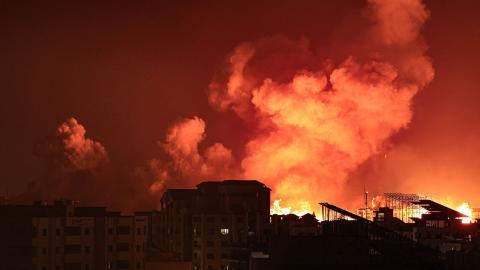The latest Israeli-Hamas war makes abundantly clear that there can be no lasting peace in the Middle East without a regional solution to the long-running conflict between Israelis and Palestinians.
There are two paths forward. One favors deepening the conflict in pursuit of a fantasy of completely wiping Israel off the map. This path is preferred by Iran. Hamas, which unleashed unprecedented carnage against innocent civilians inside Israel this weekend, has publicly declared that the attacks were backed by Iran. Israel’s likely brutal retaliation inside Gaza will play into Iran’s hands by deepening existing enmities.
Another path, preferred by Saudi Arabia, promises a lasting consensus-based peace between the people of the region. Twenty-one years ago, Saudi Arabia put considerable diplomatic and political effort into the Arab Peace Initiative (API), a proposal that unified all Arab states in offering Israel recognition, regional legitimacy and security in exchange for a series of concessions, including a return to pre-1967 borders.
Twenty-one years is a long time, and realities on the ground today might make provisions such as a return to pre-1967 borders seem dated. But Saudi officials remain convinced that the API is a solid foundation from which good-faith negotiations can proceed. A just final settlement will not be easy or obvious. But it is within reach.
For its part, Saudi Arabia’s efforts at working toward peace have only gained momentum since the Biden administration has gotten more engaged. In a recent interview with Fox News’s Bret Baier, Saudi Crown Prince Mohammed bin Salman reiterated his country’s commitment to easing the life of Palestinians through negotiations for normalization. And at the U.N. General Assembly, Saudi Arabia’s foreign minister, Prince Faisal bin Farhan al-Saud, underlined that the API remains the kingdom’s preferred blueprint for advancing that goal.
Yet there seems to be no political will in Israel to stop the policies of brutalization, humiliation and expropriation of the Palestinians. Israel’s intransigence on the Palestinian question persists despite many in Israeli society appreciating the value of a lasting two-state solution, especially as opposed to a one-state reality that would relegate Jews to minority status.\
During the negotiations exploring a normalization of relations between Saudi Arabia and Israel, the whispers coming from the Israeli side suggested that Saudi Arabia was uninterested in the Palestinian issue — that it was a secondary problem for the kingdom, which prioritized its national security interests. Despite repeated clarifications from Saudi officials on the centrality of the Palestinian issue to the deal, that perception of Saudi indifference has unfortunately prevailed.
In response to these allegations, one senior Saudi official told me in frustration on the sidelines of the U.N. General Assembly that he finds it mind-boggling that Israelis can’t seem to understand that it is fundamentally in their interest to seek a credible framework for negotiations that could deliver lasting peace. He warned that absent such a process, any negotiations would be hostage to the whims of the purveyors of perpetual violence — and to the predictable responses they will elicit from hard-liners on the other side.
The Saudi impulse to find practical and actionable solutions to this conflict is genuine and serious. The kingdom understands that a successful settlement of the Palestinian issue is the greatest threat to Iran’s strategy of fomenting perpetual violence — a strategy that has led it to cultivate a transnational network of “resistance” proxies from Yemen to Iraq to Lebanon to Gaza, immiserating the lives of tens of millions of people and destabilizing the region. No country besides Iran can mobilize the region’s Islamist militant groups to wage war in concert. And no country but Saudi Arabia can mobilize Muslim states to act collectively to build and protect a lasting peace.
It is now up to the Israelis whether to engage in a credible peace process that will end the tragic cycle of violence, including the war we are watching play out today.
Those rejoicing at the death of civilians and the inhumane treatment of prisoners must not be allowed to set the agenda for the future of the region. The majority of Palestinians and Israelis are not interested in more bloodshed. They are primarily interested in the safety and well-being of their families. It is no accident that the enemies of peace and progress on both sides sound the same: They display the stigmata of Hamas’s terrorist attacks or the terrorist bombings of Gazan civilians and then cry for rivers of blood. The injuries on both sides are very real, but the violent solutions they offer are an illusion. Blood will produce only more blood.
By launching these horrendous attacks, the enemies of peace are attempting to dictate their terms to the parties involved in this conflict. Their actions are shocking and designed to be so — precisely because U.S.-Saudi-Israeli negotiations have picked up pace. They lashed out because they rightly saw the possibility of peace as a threat to their plans for perpetual bloodshed. Israel must now make the difficult decision to deny them that pleasure.
















